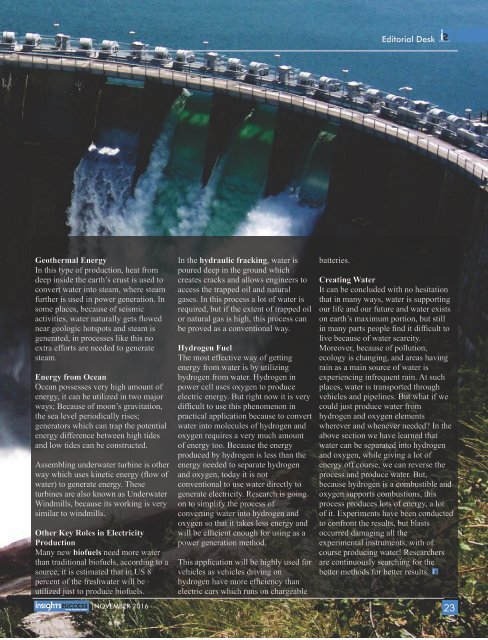Insights Success The 10 Fastest Growing Utilities and Energy Solutions Provider Companies
Insights Success The 10 Fastest Growing Utilities and Energy Solutions Provider Companies
Insights Success The 10 Fastest Growing Utilities and Energy Solutions Provider Companies
You also want an ePaper? Increase the reach of your titles
YUMPU automatically turns print PDFs into web optimized ePapers that Google loves.
Editorial Desk<br />
Geothermal <strong>Energy</strong><br />
In this type of production, heat from<br />
deep inside the earth’s crust is used to<br />
convert water into steam, where steam<br />
further is used in power generation. In<br />
some places, because of seismic<br />
activities, water naturally gets flowed<br />
near geologic hotspots <strong>and</strong> steam is<br />
generated, in processes like this no<br />
extra efforts are needed to generate<br />
steam.<br />
<strong>Energy</strong> from Ocean<br />
Ocean possesses very high amount of<br />
energy, it can be utilized in two major<br />
ways; Because of moon’s gravitation,<br />
the sea level periodically rises;<br />
generators which can trap the potential<br />
energy difference between high tides<br />
<strong>and</strong> low tides can be constructed.<br />
Assembling underwater turbine is other<br />
way which uses kinetic energy (flow of<br />
water) to generate energy. <strong>The</strong>se<br />
turbines are also known as Underwater<br />
Windmills, because its working is very<br />
similar to windmills.<br />
Other Key Roles in Electricity<br />
Production<br />
Many new biofuels need more water<br />
than traditional biofuels, according to a<br />
source, it is estimated that in US 8<br />
percent of the freshwater will be<br />
utilized just to produce biofuels.<br />
In the hydraulic fracking, water is<br />
poured deep in the ground which<br />
creates cracks <strong>and</strong> allows engineers to<br />
access the trapped oil <strong>and</strong> natural<br />
gases. In this process a lot of water is<br />
required, but if the extent of trapped oil<br />
or natural gas is high, this process can<br />
be proved as a conventional way.<br />
Hydrogen Fuel<br />
<strong>The</strong> most effective way of getting<br />
energy from water is by utilizing<br />
hydrogen from water. Hydrogen in<br />
power cell uses oxygen to produce<br />
electric energy. But right now it is very<br />
difficult to use this phenomenon in<br />
practical application because to convert<br />
water into molecules of hydrogen <strong>and</strong><br />
oxygen requires a very much amount<br />
of energy too. Because the energy<br />
produced by hydrogen is less than the<br />
energy needed to separate hydrogen<br />
<strong>and</strong> oxygen, today it is not<br />
conventional to use water directly to<br />
generate electricity. Research is going<br />
on to simplify the process of<br />
converting water into hydrogen <strong>and</strong><br />
oxygen so that it takes less energy <strong>and</strong><br />
will be efficient enough for using as a<br />
power generation method.<br />
This application will be highly used for<br />
vehicles as vehicles driving on<br />
hydrogen have more efficiency than<br />
electric cars which runs on chargeable<br />
batteries.<br />
Creating Water<br />
It can be concluded with no hesitation<br />
that in many ways, water is supporting<br />
our life <strong>and</strong> our future <strong>and</strong> water exists<br />
on earth’s maximum portion, but still<br />
in many parts people find it difficult to<br />
live because of water scarcity.<br />
Moreover, because of pollution,<br />
ecology is changing, <strong>and</strong> areas having<br />
rain as a main source of water is<br />
experiencing infrequent rain. At such<br />
places, water is transported through<br />
vehicles <strong>and</strong> pipelines. But what if we<br />
could just produce water from<br />
hydrogen <strong>and</strong> oxygen elements<br />
wherever <strong>and</strong> whenever needed? In the<br />
above section we have learned that<br />
water can be separated into hydrogen<br />
<strong>and</strong> oxygen, while giving a lot of<br />
energy off course, we can reverse the<br />
process <strong>and</strong> produce water. But,<br />
because hydrogen is a combustible <strong>and</strong><br />
oxygen supports combustions, this<br />
process produces lots of energy, a lot<br />
of it. Experiments have been conducted<br />
to confront the results, but blasts<br />
occurred damaging all the<br />
experimental instruments, with of<br />
course producing water! Researchers<br />
are continuously searching for the<br />
better methods for better results.<br />
|NOVEMBER 2016<br />
23


















